六上英语第五六单元课本复习
六年级上册英语五单元

在中国大陆的英语教材中,六年级上册英语第五单元可能会以不同的主题呈现。
由于不同出版社和版本的教材内容会有所不同,以下是一些可能包含的主题和相关词汇:1. 职业(Jobs):学生可能会学习关于不同职业的词汇,例如:teacher, doctor, nurse, driver, engineer, farmer, chef等。
2. 日常活动(Daily Activities):单元可能会涉及日常活动的描述,使用的词汇包括:eat, sleep, go to school, do homework, play sports等。
3. 食物和饮料(Food and Drinks):学习不同食物和饮料的名称,如:rice, noodles, bread, milk, tea, coffee, juice等。
4. 家庭(Family):单元可能包括家庭成员的称呼,例如:mother, father, sister, brother, grandparent等。
5. 学校科目(School Subjects):学习不同学校科目的名称,如:mathematics, English, Chinese, science, history, geography等。
6. 动物(Animals):学习不同动物的英文名称,如:cat, dog, elephant, tiger, panda, zebra等。
7. 天气(Weather):描述天气情况的词汇,例如:sunny, cloudy, rainy, windy, snowy, hot, cold等。
8. 节日(Festivals):学习中国和西方的一些主要节日,如:Spring Festival, Mid-Autumn Festival, Christmas, Thanksgiving等。
每个单元通常都包括课文、单词、语法点、练习题和可能的听力或阅读材料,以帮助学生理解和运用所学的语言知识。
六上英语第六单元知识点
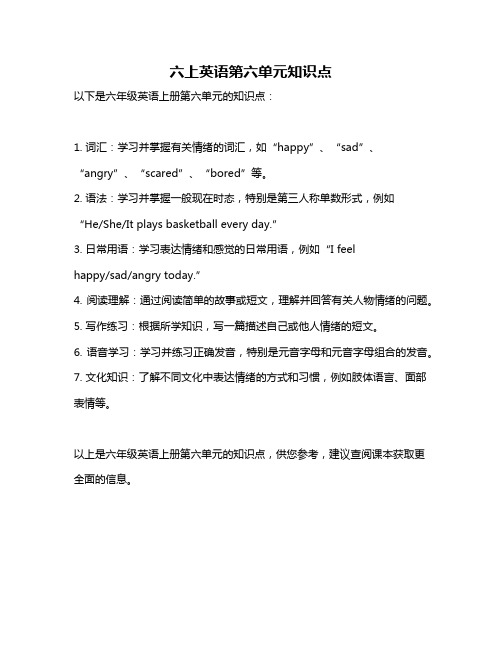
六上英语第六单元知识点
以下是六年级英语上册第六单元的知识点:
1. 词汇:学习并掌握有关情绪的词汇,如“happy”、“sad”、“angry”、“scared”、“bored”等。
2. 语法:学习并掌握一般现在时态,特别是第三人称单数形式,例如
“He/She/It plays basketball every day.”
3. 日常用语:学习表达情绪和感觉的日常用语,例如“I feel
happy/sad/angry today.”
4. 阅读理解:通过阅读简单的故事或短文,理解并回答有关人物情绪的问题。
5. 写作练习:根据所学知识,写一篇描述自己或他人情绪的短文。
6. 语音学习:学习并练习正确发音,特别是元音字母和元音字母组合的发音。
7. 文化知识:了解不同文化中表达情绪的方式和习惯,例如肢体语言、面部表情等。
以上是六年级英语上册第六单元的知识点,供您参考,建议查阅课本获取更全面的信息。
2023-2024译林版(三起)英语六年级上册Unit6单元巩固与复习(讲义)

6A Unit5 重点知识词汇背诵过关:1.Words:1.保持,维持2.干净的,整洁的3.使……变得4.肮脏的5.博物馆6.地面,地上8.空气9. 烟雾10.垃圾11.肮脏的,乱七八糟的12.死的13. 垃圾桶14.种植,栽种15. 更多的16.扔17. 果皮18. 滑到19.摔倒20.放,安置22. 工厂2.Phrases:1. 保持我们城市的整洁2. 这些城市的图片3. 使我们的城市变脏4. 汽车尾气5. 使空气变脏6. 许多垃圾7. 来自工厂的黑烟8.脏的河流9. 使街道脏乱10.水里的垃圾11. 死鱼12. 乘公交和地铁上学13. 步行上学14.把工厂搬离城市15. 把垃圾放进垃圾箱16.种更多的树17. 帮助净化空气18.你的主意19. 做得好20. 扫地21. 擦课桌椅22. 把垃圾扔在地上23. 两只小画眉24. 坐在山上25. 回来26. 走回家27. 放学后28. 喜欢住在城市29. 许多博物馆和电影院30. 干净而美丽31. 把香蕉皮扔地上32.喜欢吃香蕉33. 不应该那么做34. 捡起它35. 被香蕉皮滑倒36. 去医院37. 为了保持公园整洁38.使房间变脏39. 滑倒40. 如何保持我们的学校整洁3.Sentences:(抽背)1. What makes the air dirty? 什么使空气变脏?Smoke makes the air dirty.烟雾使空气变脏。
2. What makes the streets messy and dirty? 什么使街道变得又乱又脏?Rubbish makes the streets messy and dirty. 垃圾使街道变得又乱又脏。
3. What can we do to keep our city clean? 保持我们的城市整洁,我们可以做什么?We can take the bus and the metro to school. 我们可以乘公共车和地铁上学。
六年级英语上册教材知识梳理

六年级英语上册教材知识梳理王玉玺六年级上册英语教材共8个单元,其中包括两个复习单元。
每单元分为A、B、C三部分。
A、B部分要求掌握。
B部分是A部分语言的扩展,C部分供选学,是A、B部分知识的扩展和综合的语言运用。
本册教材要求学生能听、说、读、写七十一个短语和单词以及十组句子和七个单句(包括社区生活,交通法律,课余生活,业余爱好,职业,水的循环等几个话题)。
能在真实或模拟真实的语境中正确运用并能读懂简单语篇及欣赏、学会说唱八个歌谣。
具体细化为:四会(听、说、读、写)单词:Unit 1:by (经……,乘……) foot(脚) bike(自行车) bus(公共汽车) train(火车) how(怎样) go to school(上学)traffic(交通)traffic light(交通灯)traffic rule(交通规则) stop(停;停车站)wait(等;等待) get to(到达) by plane(乘飞机) by ship(乘轮船) by subway(乘地铁)Unit 2:library(图书馆) post office(邮局) hospital(医院) cinema(电影院) bookstore(书店)turn(转弯) then(然后) where(在哪里,到哪里) please(请) next to(与……相邻) turn right (向右转) turn left(向左转) go straight(笔直走) north(北) south(南) east(东) west(西) Unit 3:next week(下周) this morning(今天上午) thisafternoon(今天下午) this evening (今天晚上) comic book(漫画书) post card(明信片) newspaper(报纸) buy(购买)Unit 4:hobby(爱好) ride a bike—riding a bike(骑自行车) play the violin—playing the violin(拉小提琴) dive—diving(跳水) make kites—making kites(制作风筝) collect stamps—collecting stamps(集邮) live—lives(居住) teach —teaches(教) go—goes(去) watch—watches(看) read—reads(读,看) does(助动词,无义) doesn’t=does not Unit 5:singer(歌唱家,歌手) writer(作家) actor(男演员) actress(女演员) artist(画家)TV reporter(电视台记者) engineer(工程师) accountant(会计) salesperson(销售员)policeman(男警察) cleaner(清洁工) where(在哪里;到哪里)work(工作)Unit 6:rain(雨;下雨) cloud (云;云彩) sun(太阳) stream((小)河;(小)溪) come from(来自……;从……来) seed(种子) soil(土壤) sprout (苗;芽;嫩芽) plant(植物;种植) should (应该) then(然后)三会(听、说、认读)单词:a pair of(一双) always(总是;一直) dictionary(词典;字典) magazine(杂志) tomorrow(明天) excuse me (对不起) fun(快乐;乐趣) go to the cinema(去看电影) look (看上去) month(月份;月) read a magazine(阅读杂志) science museum(科学博物馆) shoe store(鞋店) show(展览;演出;表演;节目) take(乘坐) take a trip(去旅行) tell(告诉)tonight(今晚) vapour(蒸汽;水汽) want(想要) with(同……;和……) know(知道) minute(分钟) again(再一次;又;再)四会(听、说、读、写)句型:Unit 1How do you go to school, Sarah? Usually I go to school on foot. Sometimes I go by bike.How can I get to Zhongshan Park?You can go by the No.15 bus.Unit 2Where is the cinema, please? It’s next to the hospital. Turn left at the cinema, then go straight. It’s on the left. Unit 3What are you going to do on the weekend? I’m going to visit my grandparents this weekend.Where are you going this afternoon? I’m going to the bookstore.What are you going to buy? I am going to buy a comic book. Unit 4What’s your hobby? I like collecting stamps. He likescollecting stamps, too.Does she teach English? No, she doesn’t.Does she teach you math? Yes, she does.Unit 5What does your mother do? She is a TV reporter.Where does she work? She works in a school.How does she go to work? She goes to work by bus.Unit 6Where does the rain come from? It comes from the clouds. How do you do that?What should you do then?三会(听、说、认读)句型:1. My home is near.What about you?Look at the traffic lights.Remember the traffic rules.Stop at a red light.Wait at a yellow light.Go at a green light.Can I go on foot? Sure, if you like. It’s not far. Where is the …? It’s near the …Excuse me, is there a … near here? Yes, there is.Is it far from here? No, it’s not far.–Thank you. –You’re welcome.Where is the …?It’s east/west/south/north of the …When are you going? I am going at 3 o’clock.Can he go with us? Sure.Let’s go together.There is a stamp show on Sunday.She is a teacher. She teaches math.Does your pen pal live in Shanghai?No, he doesn’t. He lives in Beijing.Where does she work? She works in a car company. How does she go to work? She goes to work by bus. Where does the … come from? It comes from the …How can the water become vapour?The sun shines and the water becomes vapour.How do you do that?First, put the seeds in the soil.It’s easy.What should you do then?Water them. In several days, you can see a sprout. First, …Then, …Next, …At last, …语法:一、现在进行时态(3种变化规律)1. 直接加ing:do—doing draw—drawing cook—cooking answer—answering read—reading listen—listening fly—flying sing—singing play—playing2. 去掉末尾的e加ing:write—writing dance—dancing take—taking have—having make—making ride—riding dive —diving3. 双写末尾字母加ing:get—getting run—running swim—swimming sit—sitting put—putting你正在干什么? What are you doing? I’m answering the phone. 他/她/它正在干什么?What is he/she/it doing? He’s/She’s/It’s …他(她、它)们正在干什么?What are they doing? They are …看到like或likes后面的动词要加上ing二、一般将来时态 (be going to/will + 动词原形)表示一般将来时的时间状语有:this morning, this afternoon, this evening, tomorrow, tonight, this weekend, on the weekend, next week, next month, next year, next weekend.(今晚)你将要做什么?What are you going to do (this evening)? I’m going to the cinema. I’m going to visit my grandparents.你将什么时候去? When are you going? I’m going at 7:10.你将怎样去呢? How are you going? I’m going by bus.今天下午你将要去哪里?Where are you going this afternoon? I’m going to the bookstore.你将要买什么呢? What are you going to buy? I’m going to buy a comic book.你将和谁一起去? Who are you going with? I’m going with my parents.三、第三人称单数后面的动词要加s或es1. 一般情况加s,如:read—reads;live—lives;play—plays;sing—sings2. 动词末尾以s,x,ch,sh或部分以o结尾的加es。
六年级英语上册第五单元知识点归纳及复习题
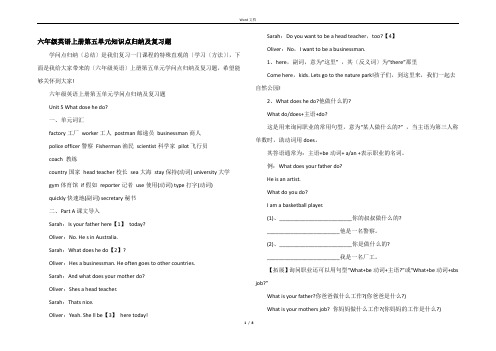
六年级英语上册第五单元知识点归纳及复习题学问点归纳〔总结〕是我们复习一门课程的特殊直观的〔学习〔方法〕〕,下面是我给大家带来的〔六年级英语〕上册第五单元学问点归纳及复习题,希望能够关怀到大家!六年级英语上册第五单元学问点归纳及复习题Unit 5 What dose he do?一、单元词汇factory工厂worker工人postman邮递员businessman商人police officer警察Fisherman渔民scientist科学家pilot飞行员coach 教练country国家head teacher校长sea大海stay保持(动词) university大学gym体育馆if假如reporter记者use使用(动词) type打字(动词)quickly快速地(副词) secretary秘书二、Part A课文导入Sarah:Is your father here【1】today?Oliver:No. He s in Australia.Sarah:What does he do【2】?Oliver:Hes a businessman. He often goes to other countries.Sarah:And what does your mother do?Oliver:Shes a head teacher.Sarah:Thats nice.Oliver:Yeah. She ll be【3】here today!Sarah:Do you want to be a head teacher,too?【4】Oliver:No,I want to be a businessman.1、here,副词,意为“这里” ,其〔反义词〕为“there”那里Come here,kids. Lets go to the nature park!孩子们,到这里来,我们一起去自然公园!2、What does he do?他做什么的?What do/does+主语+do?这是用来询问职业的常用句型,意为“某人做什么的?” ,当主语为第三人称单数时,助动词用does。
六年级上册第五单元英语笔记
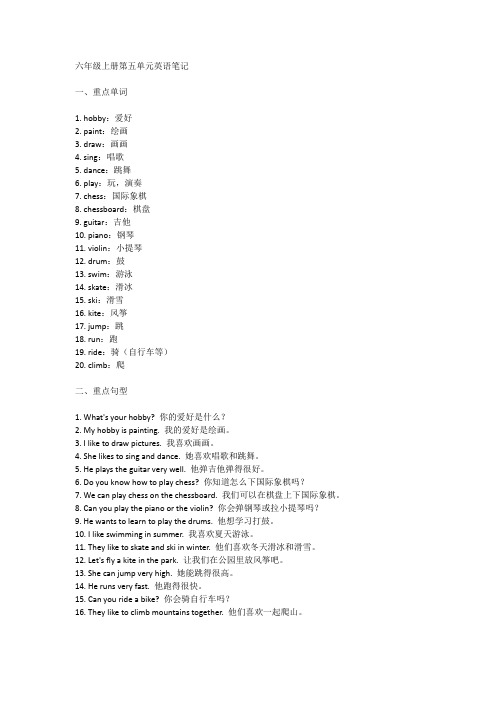
六年级上册第五单元英语笔记一、重点单词1. hobby:爱好2. paint:绘画3. draw:画画4. sing:唱歌5. dance:跳舞6. play:玩,演奏7. chess:国际象棋8. chessboard:棋盘9. guitar:吉他10. piano:钢琴11. violin:小提琴12. drum:鼓13. swim:游泳14. skate:滑冰15. ski:滑雪16. kite:风筝17. jump:跳18. run:跑19. ride:骑(自行车等)20. climb:爬二、重点句型1. What's your hobby? 你的爱好是什么?2. My hobby is painting. 我的爱好是绘画。
3. I like to draw pictures. 我喜欢画画。
4. She likes to sing and dance. 她喜欢唱歌和跳舞。
5. He plays the guitar very well. 他弹吉他弹得很好。
6. Do you know how to play chess? 你知道怎么下国际象棋吗?7. We can play chess on the chessboard. 我们可以在棋盘上下国际象棋。
8. Can you play the piano or the violin? 你会弹钢琴或拉小提琴吗?9. He wants to learn to play the drums. 他想学习打鼓。
10. I like swimming in summer. 我喜欢夏天游泳。
11. They like to skate and ski in winter. 他们喜欢冬天滑冰和滑雪。
12. Let's fly a kite in the park. 让我们在公园里放风筝吧。
13. She can jump very high. 她能跳得很高。
六年级上册英语知识点复习提纲
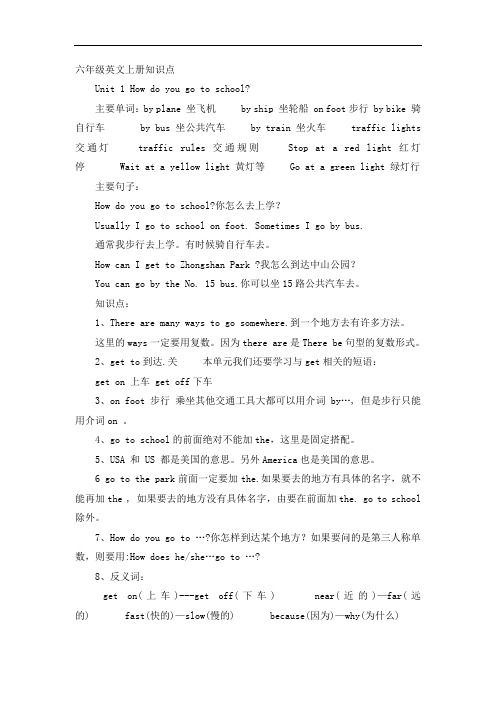
六年级英文上册知识点Unit 1 How do you go to school?主要单词:by plane 坐飞机 by ship 坐轮船 on foot步行 by bike 骑自行车 by bus 坐公共汽车 by train 坐火车 traffic lights 交通灯traffic rules交通规则Stop at a red light 红灯停 Wait at a yellow light 黄灯等 Go at a green light 绿灯行主要句子:How do you go to school?你怎么去上学?Usually I go to school on foot. Sometimes I go by bus.通常我步行去上学。
有时候骑自行车去。
How can I get to Zhongshan Park ?我怎么到达中山公园?You can go by the No. 15 bus.你可以坐15路公共汽车去。
知识点:1、There are many ways to go somewhere.到一个地方去有许多方法。
这里的ways一定要用复数。
因为there are是There be句型的复数形式。
2、get to到达.关本单元我们还要学习与get相关的短语:get on 上车 get off下车3、on foot 步行乘坐其他交通工具大都可以用介词by…, 但是步行只能用介词on 。
4、go to school的前面绝对不能加the,这里是固定搭配。
5、USA 和 US 都是美国的意思。
另外America也是美国的意思。
6 go to the park前面一定要加the.如果要去的地方有具体的名字,就不能再加the , 如果要去的地方没有具体名字,由要在前面加the. go to school 除外。
7、How do you go to …?你怎样到达某个地方?如果要问的是第三人称单数,则要用:How does he/she…go to …?8、反义词:get on(上车)---get off(下车) near(近的)—far(远的) fast(快的)—slow(慢的) because(因为)—why(为什么)same(相同的)—different(不同的)9、近义词:see you---goodbye sure---certainly---of course10、频度副词:always 总是,一直 usually 通常 often经常 sometimes 有时候 never 从来不Unit 2 Where is the science museum?主要单词:library 图书馆 post office 邮局 hospital医院 cinema 电影院 bookstore书店 science museum科学博物馆 turn left向左转 turn right 向右转 go straight 直行 north北 south南 east东 west西主要句子:Where is the cinema, please? 请问电影院在哪里?It’s next to the hospital. 它与医院相邻。
(NEW)人教版小学六年级英语上册《第五单元》知识点及复习题
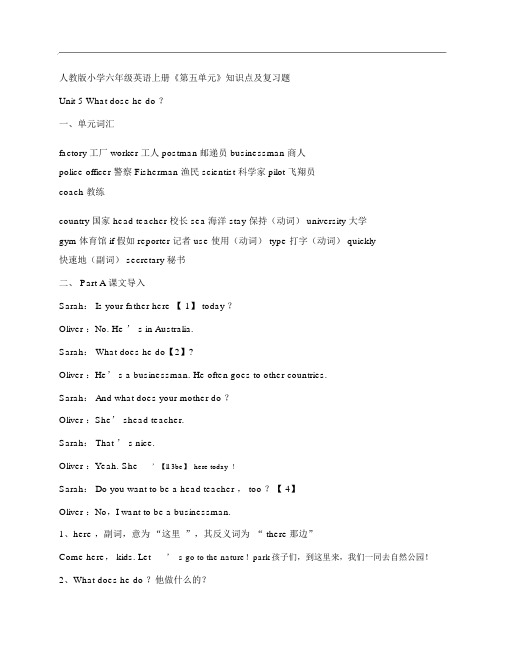
人教版小学六年级英语上册《第五单元》知识点及复习题Unit 5 What dose he do ?一、单元词汇factory 工厂 worker 工人 postman 邮递员 businessman 商人police officer 警察 Fisherman 渔民 scientist 科学家 pilot 飞翔员coach 教练country 国家 head teacher 校长 sea 海洋 stay 保持(动词) university 大学gym 体育馆 if 假如 reporter 记者 use 使用(动词) type 打字(动词) quickly快速地(副词) secretary 秘书二、 Part A 课文导入Sarah: Is your father here 【 1】 today ?Oliver :No. He ’ s in Australia.Sarah: What does he do【2】?Oliver :He’ s a businessman. He often goes to other countries.Sarah: And what does your mother do ?Oliver :She’ shead teacher.Sarah: That ’ s nice.Oliver :Yeah. She’【ll 3be】here today!Sarah: Do you want to be a head teacher , too ?【 4】Oliver :No,I want to be a businessman.1、here ,副词,意为“这里”,其反义词为“ there那边”Come here, kids. Let’ s go to the nature!park孩子们,到这里来,我们一同去自然公园!2、What does he do ?他做什么的?What do/does+ 主语 +do?这是用来咨询职业的常用句型,意为“某人做什么的?”,当主语为第三人称单数时,助动词用 does。
人教版六年级英语上册第六单元知识点归纳及复习题

人教版六年级英语上册第六单元知识点归纳及复习题Unit 6: How Do You Feel?Part AVocabulary:1.Adjectives: angry。
afraid。
ill。
worried。
happyn:A:Hey。
let's have some popcorn."Yum。
I'm so happy。
I love popcorn!"Here you are。
I'll go and get some drinks。
Wait for me."Hey。
where is my popcorn?"Yum。
It was so good."What。
How could you eat all the popcorn。
We should share!"Mum。
if I feel angry。
what should I do?"Well。
first。
take a deep breath。
Then you should count to ten."After that。
"After that。
XXX."Mum。
I XXX I count to ten。
too?"No。
dear。
you should see a doctor."1."Here you are!" is a partially XXX with a n adverb such as "here," "there," or "away," and the verb is "be," "come," or "go,"the XXX.In an inverted sentence。
六年级英语上册第六单元知识点归纳及复习题(人教版)

六年级英语上册第六单元知识点归纳及复习题(人教版)本资料为woRD文档,请点击下载地址下载全文下载地址Unit6 Howdoyoufeel?PartA一、主要词汇①形容词:angry生气的afraid害怕的ill生病的worried担心的happy高兴的二、课文导入AHey,let’shavesomepopcorn.yum!I’msohappy.Ilovepopcorn!Hereyouare.【1】I’llgoandgetsomedrinks.waitforme.【2】Hey,whereismypopcorn?yum!Itwassogood.what?Howcouldyoueatallthepopcorn?!【3】weshouldshare!mum,ifIfeelangry,whatshouldIdo?【4】well,first,takeadeepbreath.【5】Thenyoushouldcounttoten.Afterthat...?Afterthat,youwon’tfeelsoangry.mum,Ifeelill.ShouldIcounttoten,too?No,dear,youshouldseeadoctor.、Hereyouare!给你!这是一个部分倒装的句子。
当句子以here,there,away等地点副词开头,且谓语动词是be动词,come,go等时,句子常用倒装结构。
①在倒装句中,如果主语是人称代词,则主语与谓语不倒装,构成“Here/there/away...+主语+谓语动词”部分倒装结构。
例句:Hereweare!我们到了!Awayhewent!他离开了!②如果句子的主语为名词,句子常用完全倒装结构,即构成“here/there/away...+谓语动词+主语”结构。
例句:Herecomesthebus!公共汽车来了Theregoesmike!麦克走去那边了2、wait等待;waitforsb/sth等待某人/某物3、Howcouldyoueatallthepopcorn?!你怎么能吃光所有的爆米花?!特殊疑问代词how:如何(方式),怎样(感受),怎么可以(质问)could是can的过去式这是一个由how引导的含有情态动词could的特殊疑问句,其基本句型为:howcould+sb+动词原形+其他?;该句型意为“某人怎么能做某事呢?”,用于表示震惊、强烈反感或愤怒。
人教版六年级英语上册Unit5 第五单元知识总结

Unit5What does he do?一、核心词汇1. 名词: factory工厂worker工人postman邮递员businessman 商人;企业家fisherman渔民scientist科学家pilot飞行员coach教练2. 短语: police officer警察二、了解词汇:1. 名词: country 国家sea 大海 university 大学gym 体育馆reporter 记者secretary 秘书2. 其他: stay保持if如果use使用type打字quickly迅速地3. 短语: head teacher校长三、核心句型1. — What does he do?他是做什么的?— He’s a businessman. 他是商人。
解读:这是询问某人的职业的常用句型及回答。
句型结构: What do/does … do?……是做什么的?— What do you do?你是做什么的?— I’m a doctor. 我是医生。
— What does your father do?你爸爸是做什么的?— He is an engineer. 他是工程师。
拓展:问职业还可以用“What’s sb?”来询问。
— What’s your mother?你妈妈是做什么的?— She is an accountant.她是会计。
2. Where does he work?他在哪儿工作?解读:这是常见的询问某人工作地点的句型。
句型结构: Where do/does … work? ……在哪儿工作?— Where does Mike work?迈克在哪儿工作?— He works in a bank. 他在一家银行工作。
— Where does your father work?你爸爸在哪儿工作?— He works in a company. 他在一家公司工作。
3. How does he go to work?他怎么去上班?解读: 这是询问他人乘什么交通工具的句型。
六年级英语上册复习知识

六年级英语上册复习知识(一)(一)一般现在时1、概念:表示经常性或习惯性发生的动作。
2、标志词:often,usually,sometimes, alaways, every day等3、主语是第三人称单数he, she, it 时,谓语动词要加s或es,其他人称动词要用原形。
4、主语是第三人称单数时,动词变化规则:A、一般情况,在动词后面直接加s,如:walk-walks.B、以sh, ch, o结尾的,在动词后面加es,如:wash-washes,watch-watches, go--goesC、以辅音加y结尾,将y改为i,再加es,如:study-studies.(二)现在进行时:1、概念:表示正在发生的事情或动作。
2、标志词:now, look, listen , it’s……3、结构:b e(am, is , are)+动词ing4、动词加的规则如下:A、一般情况下,在动词后面直接加ing,如:listen-listeningB、以不发音的e结尾,去e加ing,如:take-taking (make, like, write , come)C、以重读闭音节(辅音+元音+辅音)结尾的,要双写最后一个字母再加ing,如put-putting, (get, sit, stop , run, swim, set)但:see-seeing, eat –eating.(三)一般将来时:1、概念:表示将要发生的事或打算,计划要做的事。
2、标志词:this weekend, next Monday, tomorrow, in seven years’ time3、结构:be(am, is , are) going to +动词原形或者 Will+动词原形如:I am going to take a trip next week.4、否定句:be+not going to +动词原形或者 Will+not(等于won’t)+动词原形(四)一般过去时:1、概念:表示在过去的时间里所发生的事或动作。
六年级英语上册第五单元复习
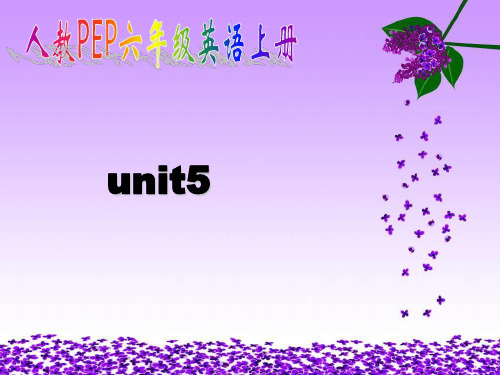
(go)home at 6:00 every day.
11.
(she)hobby is singing.
12. My father
(watch)TV every day.
13. Alice
(be)my pen pal.
14. Her uncle
(work)in a bank.
让我们来归类吧!
以字母a开头的职业词:
由动词变成相应的名词:
1.一般情况下加er或or, 如果以e结尾的单词直接加r
动词
teach + er clean sing
dance + r
drive write
名词
teacher cleaner singer
dancer
driver writer
动词
act + or visit
动词
run win
actor actress
artist accountant
以字母b开头的职业词:
bus driver
以字母c开头的职业词:
cleaner
以字母d开头的职业词:
doctor driver dancer diver
以字母e开头的职业词:
engineer
以字母f开头的职业词:
farmer fireman fisherman
unit5
按要求写单词:
drive(名词) singer(动词)
drit(名词)
actor
visit(名词)
visitor
worker(动词)
work
writer(动词)
write
policeman(复数) policemen
六年级上册英语重点单词重点句子总复习
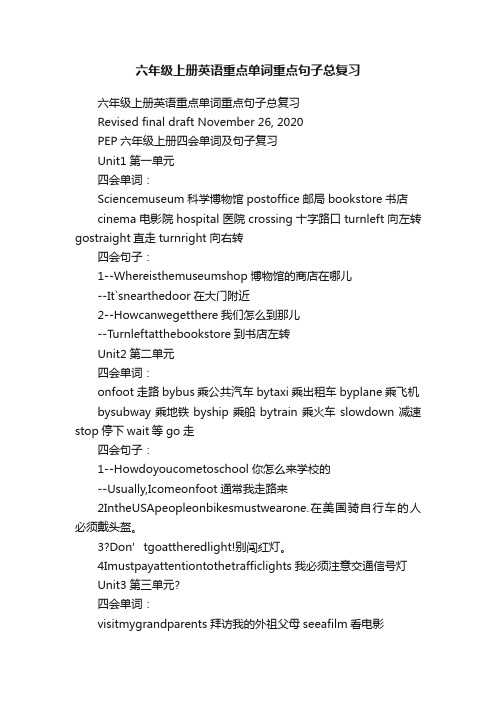
六年级上册英语重点单词重点句子总复习六年级上册英语重点单词重点句子总复习Revised final draft November 26, 2020PEP六年级上册四会单词及句子复习Unit1第一单元四会单词:Sciencemuseum科学博物馆postoffice邮局bookstore书店cinema电影院hospital医院crossing十字路口turnleft向左转gostraight直走turnright向右转四会句子:1--Whereisthemuseumshop博物馆的商店在哪儿--It`snearthedoor在大门附近2--Howcanwegetthere我们怎么到那儿--Turnleftatthebookstore到书店左转Unit2第二单元四会单词:onfoot走路bybus乘公共汽车bytaxi乘出租车byplane乘飞机bysubway乘地铁byship乘船bytrain乘火车slowdown减速stop停下wait等go走四会句子:1--Howdoyoucometoschool你怎么来学校的--Usually,Icomeonfoot通常我走路来2IntheUSApeopleonbikesmustwearone.在美国骑自行车的人必须戴头盔。
3?Don’tgoattheredlight!别闯红灯。
4Imustpayattentiontothetrafficlights我必须注意交通信号灯Unit3第三单元?四会单词:visitmygrandparents拜访我的外祖父母seeafilm看电影takeatrip远行gotothesupermarket去超市dictionary词典comicbook连环画书wordbook单词书postcard明信片四会句子:1--Whatareyougoingtodotomorrow你明天打算做什么--I’mgoingtohaveanartlesson.我要上美术课2?We’regoingtodrawsomepicturesinRenminPark.我要到人民公园去画画3--Whereareyougoing你们打算去哪儿--We`regoingtothecinema我们打算去电影院4Whenareyougoing你们什么时候去Unit4第四单元四会单词:dancing跳舞singing唱歌readingstories看故事书playingfootball踢足球doingkungfu打功夫cooksChinesefood做中国菜studiesChinese学习汉语doeswordpuzzles猜字谜goeshiking远足四会句子:1--WhatarePeter`shobbies彼得有什么爱好--Helikesreadingstories他喜欢读故事2--DoesheliveinSydney他住在悉尼吗--No,hedoesn`t不,他没有3--Doeshelikedoingwordpuzzlesandgoinghiking他喜欢猜字谜和远足吗--Yes,hedoes是的,他喜欢Unit5第五单元?四会单词:factoryworker工厂工人postman邮递员businessman生意人policeofficer警察fisherman渔民scientist科学家pilot飞行员coach教练四会句子:1--Whatdoeshedo他是做什么的--Heisabusinessman.他是商人2--Wheredoeshework他在哪儿工作--Heworksatsea.他在海上工作。
六年级英语上册知识点复习汇总

六年级英语上册知识点复习汇总(PEP)小学英语总复习六年级上册知识点Unit 1 How can I get there ?一、主要单词:museum博物馆bookstore书店cinema电影院turn 转弯hospital医院left向左post office 邮局science科学right向右straight笔直地 crossing十字路口二、习惯语搭配:post office邮局 science museum科学博物馆pet hospital宠物医院 Italian restaurant意大利餐馆Beihai Park 北海公园Palace Museum故宫博物院go straight直走turn right/left右/左转next to挨着in front of...在...前面near the park在公园附近on Dongfang Street在东方大街上三、惯用表达式:Excuse me 打扰一下 Follow me, please!请跟着我!四、公式化句型:1、问路的句型及其答语:问句:Where is the + 地点?······在哪儿?答语:It's + 表示地点的词语(next to the bookstore, near the hospital/post office, over there,on Dongfang Street, in front of the school... )2、询问怎么到某地的句型及其答语:问句:How can +主语 + get (to)+地点?·····怎么到·····?同义句型: Can you tell me the way to +地点?Where is + 地点? Which is the way to +地点?五、例句:Where is the cinema, please? 请问电影院在哪里?It's next to the hospital. 它与医院相邻。
六年级上册英语第五单元知识点归纳

六年级上册英语第五单元知识点归纳一、重点单词:factory worker 工人postman 邮递员businessman 商人police officer 警察policeman男警察policewoman女警察fisherman 渔民scientist 科学家pilot飞行员coach 教练singer歌手writer作家TV reporter电视台记者actor男演员actress女演员artist画家teacher老师doctor医生nurse护士driver司机farmer农民cleaner 清洁工dancer舞者football player z足球运动员家庭成员单词father=dad 爸爸mother 妈妈sister 姐姐(妹妹)brother哥哥(弟弟)aunt 阿姨(姑姑)uncle叔叔(舅舅)cousin表(堂)姐(妹)/哥(弟)反义词:happy 快乐的——sad 悲伤的二、重点句子:1. What does your mother do? 你妈妈是做什么的?2. She is a TV reporter. 她是电视台记者。
3. Where does she work? She works in a car company. 她在哪工作?她在汽车公司工作。
4. How does she go to work? She goes to work by bus. 她怎样去工作?她坐公交车工作。
5. Is your father a postman ?你的爸爸是邮递员吗?Yes, he is . (是的,他是)No ,he isn’t.(不,他不是)6.Where does she work?她在哪里工作?She works at a university. 她在大学工作。
7. H e is good at playingfootball. 他擅长踢足球。
8. If you like sports, you can be a coach.如果你喜欢运动,你就有可能成为一名教练。
六上译林版英语第五单元笔记

六上译林版英语第五单元笔记
1.词汇:该单元涉及的词汇包括一些与假期和旅行相关的词汇,如“holiday”(假期)、“vacation”(假期)、“travel”(旅行)、“trip”(旅行)等。
2.句型:该单元涉及的句型包括询问和回答关于假期和旅行的问题,如“Where did you go on vacation?”(你假期去哪里了?)、“I went to the mountains.”(我去了山区。
)等。
3.语法:该单元涉及的语法知识点包括一般过去时的用法,如动词的过去式和过去式的肯定句、否定句和一般疑问句等。
4.文化知识:该单元还介绍了不同国家的文化和传统,如印度的节日、印度的文化等。
北京版六年级英语上册第五单元知识点

Unit 5 知识点Lesson 15一、动词原形及过去式(需背、默)do—did做begin—began开始learn—learned学习think—thought想/认为have/has—had有are—were是take—took带isn’t—wasn’t不是hold—held举办go—went去can—could 能/能够二、重点词组(需背、默)1.the ancient Olympic Games古代奥运2.the modern Olympics Games现代奥运会3. be different from 不同于4. all over the country 遍及全国5. take part in 参加6. history 历史7. those 那些8. PE 体育三、重点句型(需背、默)1.---- When did the ancient Olympic Games begin? 古代奥运会什么时候开始的---- They began in 776 BC. 古代奥运会开始于公元前776年。
2.---- When did the Qin Dynasty begin? 秦朝是什么时候开始的?---- It began in 221 BC. 秦朝开始于公元前221年。
3.---- When did the Tang Dynasty begin? 唐朝什么时候开始的?---- It began in 618 AD. 唐朝开始于公元618年。
四、我会说The ancient Olympic Games began in 776 BC, about 3000 years ago. It had a history of 3000 years. The first Olympic Games were held in Olympia, a city of Greece. There were no women in the ancient Olympic Games. Only men could take part.Lesson 16一、动词及过去式(需背、默)stop—stopped 停止hold—held 举行do—did做二、重点词组(需背、默)1. a long time ago 很久以前2. What a shame! 好遗憾呀!3. the capital city of Greece 希腊的首都4. take part in 参加5. each other 互相6. Higher, Faster, Stronger 更高,更快,更强7. the motto of the modern Olympics现代奥运会的主题8. ore events 更多事件三、重点句型(需背、默)1.---- When did people hold the first modern Olympics?人们什么时候举行了第一届现代奥运会?---- They held them in 1896 in Athens. 1896年他们在希腊举行的。
- 1、下载文档前请自行甄别文档内容的完整性,平台不提供额外的编辑、内容补充、找答案等附加服务。
- 2、"仅部分预览"的文档,不可在线预览部分如存在完整性等问题,可反馈申请退款(可完整预览的文档不适用该条件!)。
- 3、如文档侵犯您的权益,请联系客服反馈,我们会尽快为您处理(人工客服工作时间:9:00-18:30)。
第五、六单元课本复习回顾班级姓名
一.单词(自画四线格)1.学习(原形)学习(三单形式) 2.字谜
3.去远足
4.笔友
5.爱好
6. 爱好复数
7.生某人气
8.害怕、、、、9.难过的10.担心的11.担心(动词)12.高兴
13.看病14.穿暖和衣服15.更多的16.深呼吸
17.数到十18.chase(三单)19.chase(ing形式)20.mouse(复数)
21.应该22.有毛病(病了)23.觉得24 健康、好的25.有病26.工厂27.工人28.邮递员29.商人30.警察
31.渔民32.飞行员33.county(复数)34.教练(复数)
35.保持36. 校长37. 在海上38. 在体育馆39.如果40.report(名词)41.使用42.快速地43.farm(名词)drive(名词)二重点短语、句子1.妈妈,如果我感到生气,我应该怎么办?(57)
2.首先,深呼吸,然后你应该从一数到十。
3. 你感觉怎样?
4.(58)这个漫画是关于什么的?
5.这只猫是个警察
6.他捉老鼠
7.他们害怕他8. 应为老鼠很坏,猫很生他们的气9. 可能我们的猫正在捉一只老鼠10.什么事(问题)?11.今天上午他应该去看医生,所以我们不能去动物园了12.不要伤心
13.我们可以下次去14.爸爸感觉怎么样了?15.他应该怎么做?16.让我们去医院17.你应该多做运动18.我应该怎么做?19.罗宾将要坐在草地上20.有一天我会帮助你21.他陷入了泥潭,他很担心22.让我们帮助你23.他们把罗宾拽出了泥潭24.人人很高兴
25.不要生气,你应该深呼吸26.不要难过27.他是干什么的?你妈妈干什么?
28.他在哪儿工作?29.他怎样去上班?乘船30.你爸爸今天在吗?
31.他经常去其他国家32. 她是一名校长33.他今天将会在
34.你也想成为校长吗?35. 我想成为一名企业家36.出祖车司机
37.清洁工38 作家39.歌手40. 舞蹈家41.女警察
42.你爸爸是一名邮递员吗?不,不是43.娇姐的妈妈是干什么的?她是一名女商人
44.他在海上工作,每天看到很多鱼45. 他有一个健康的生活,
46.他努力工作并保持健康47.我们应该好好学习,并保持健康
48.我姑姑是一名科学家49.她在大学工作50.他擅长足球、乒乓球、篮球51.放学后他经常去跑步52. 如果你喜欢运动,你可以成为一名教练53.赛若喜欢用电脑54.他想在办公室工作55.罗宾想成为一名科学家56.他学习很努力
57.他打算(将要)在哪儿工作?58. 多么好的一份工作呀!(55)56.我喜欢学习57.我不喜欢那个58.我喜欢吃坚果59.你想成为什么?(两种表达方法?)
60.Mary has a cat。
(改为否定)61.一般疑问句
62.Mary has a cat (提问)63.He gose to school by bike (否定)
64.He gose to school by bike (特殊疑问句/提问)65. 一般疑问句否定句66.我听不见你67.孩子们将会一起回家吗(54)68魏芳叔叔是做什么的?。
